Mazda views human rights as fundamental to its corporate activities. The Company does not tolerate human rights violations of any kind, including discrimination or harassment on the basis of race, nationality, faith, gender, social status, family origin, age, mental or physical disability, sexual orientation, or gender identity, in its corporate activities, whether inside or outside the Company. As guidelines for promoting respect for human rights, we established the Guidelines for Eliminating Sexual Harassment in 1999 and then the Rules for Eliminating Human Rights Violations in 2000. With these guidelines, we have been promoting respect for human rights via intranet content and education and training programs. Moreover, the Mazda Human Rights Policy formulated in August 2023 stipulates respect for human rights based on international standards, including the United Nations (UN) Universal Declaration of Human Rights, Guiding Principles on Business and Human Rights, and Ten Principles of the UN Global Compact and the ILO Declaration on Fundamental Principles and Rights at Work by the International Labour Organization. In formulating this policy, the Company prepared a draft through discussion with domestic and overseas Group companies, and this draft was reported to and approved by the Board of Directors. Going forward, the Company will continue to pursue coordination and update this policy as necessary. It will also strive to spread awareness and understanding of the policy.
RESPECT FOR HUMAN RIGHTS
Basic Approach
Initiatives
Human Rights Initiatives
Human Rights Promotion Frameworks
The Human Rights Committee, comprising executive officers and division general managers, deliberates on human rights activities. Based on the decisions made by this committee, the Human Resources Division promotes human rights protection activities and takes steps to resolve human rights issues throughout the Group. Moreover, global employee surveys are conducted to check the progress of human rights protection activities at bases worldwide and confirm whether there are any problems needing to be addressed. The results of these surveys are communicated to the respective managers to guide improvement measures when necessary. Division managers lead the activities of their divisions as human rights promotion officers, while the designated human rights representative promotes activities at business sites as well as at Group companies in Japan and overseas. At Group companies in Japan, networks are in place to facilitate the regular exchange of information. Serious human rights violations identified through these networks are reported to executive officers and other management-level members of Mazda, providing a framework that enables the implementation of solutions on a Groupwide basis. At the same time, Mazda seeks to establish a supply chain in which suppliers are also required to fulfill their social responsibilities in the area of respect for human rights based on the Mazda Supplier Sustainability Guidelines. The Company also actively coordinates with local government agencies, companies, and other external organizations to advance human rights protection activities for local communities. Such activities include participation in community human rights events and exchanges of opinion with human rights organizations.
Human Rights Promotion Framework
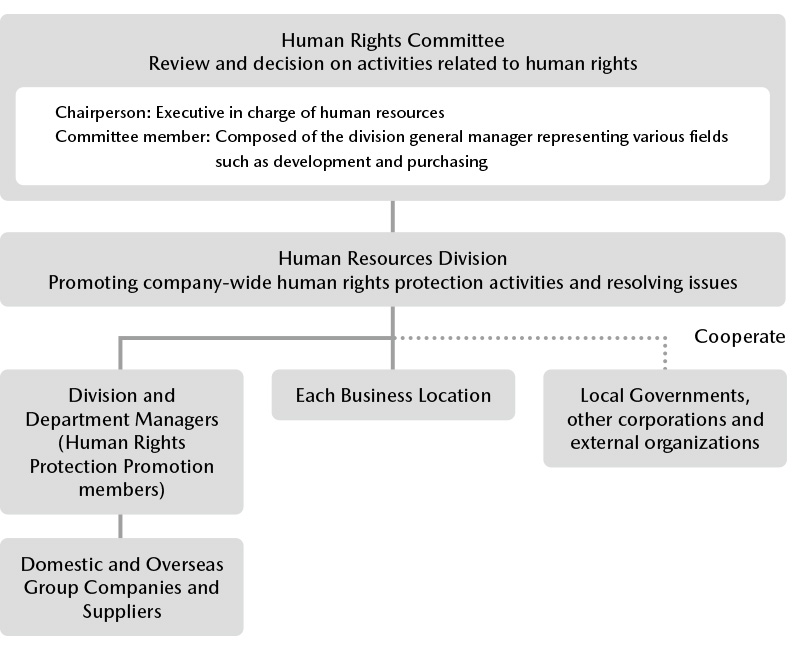

Prevention of Human Rights Violations
Mazda carries out various initiatives to eliminate human rights violations. In case a problem involving human rights violations occurs, the Company discloses the case on its intranet as an example of disciplinary action and conducts educational and awareness-raising activities in order to prevent a recurrence. The Company keeps a record of how such cases are handled, manages this record in accordance with the stipulated procedure, and submits these records to the Human Rights Committee. These records are used to formulate more effective Companywide policies and to prevent the recurrence of similar problems.
Education and Awareness-Raising Activities
Mazda conducts regular education and awareness-raising programs pertaining to human rights targeting all executive officers and employees. In March 2008, the Company became the first corporation in Japan to be awarded the Human Rights Merit Award by Japan's Ministry of Justice and the National Federation of Consultative Assemblies of Civil Liberties Commissioners. This honor was received in recognition of these initiatives and other human rights protection activities.
| Major Education and Awareness-Raising Activities | Details |
|---|---|
| Human rights training* | 【Group training】
【In-house sexual minority (LGBTQ+) sensitivity training】
【Information distribution via intranet】
Major Themes of Human Rights Mini-Lectures
|
| Messages from senior management issued during Human Rights Week* | The Company's senior management issues a message to all employees every year during Human Rights Week, in conjunction with Human Rights Day on December 10, to highlight the importance of respecting human rights. |
| Human rights meetings* | Mazda holds regular meetings (four times a year) on an individual workplace basis on familiar topics to help employees think for themselves about human rights and form their own insights. |
| Other human rights awareness-raising activities* | Mazda holds human rights slogan competitions and has established a dedicated website on its human rights protection activities. |
* These activities are only conducted at Mazda Motor Corporation.
Activities at Group Companies
In line with its One Mazda concept, which expresses its desire for all employees to act as a single team united by a set of shared values and goals, Mazda is committed to promoting human rights activities at Group companies. Adhering to the Mazda Human Rights Declaration and with reference to the Rules for Eliminating Human Rights Violations and the Guidelines to Eliminate Human Rights Violations, Group companies in Japan and overseas maintain a set of rules and guidelines that are tailored to conditions in their respective countries. Through these efforts, the Company strives to protect human rights at all Group companies. We also arrange regular information exchanges between human rights officers at Mazda and at Group companies. Depending on the circumstances of the particular company, the Company may also take steps such as providing training or educational tools, or dispatching instructors. Since FY March 2017, the Company has been supporting Group companies in establishing human rights training systems and providing materials for use in human rights meetings.
Human Rights Due Diligence
Basic Approach
In accordance with Mazda Human Rights Policy, Mazda recognizes that it must identify factors that could negatively affect human rights in its business activities, introduce human rights due diligence* systems that assign priority levels to these factors, and continuously work to prevent, reduce, rectify, or remedy these issues. The Company works to this end and is expanding the scope of its initiatives to include Group companies and suppliers both in Japan and elsewhere. Regarding Mazda Human Rights Policy, employees are informed through human rights meetings, messages from senior management, and educational programs.
* Human rights due diligence involves continuous implementation of a cycle of procedures to identify, prevent, and reduce adverse impacts on human rights in a company's business activities.
Overview of Human Rights Due Diligence Activities (Source: CRT lecture materials)


Structure
1) Basic approach
- Based on Mazda Human Rights Policy, identify adverse impact on human rights in business activities, under human rights due diligence process.
- Establish framework and structure to conduct continuous prioritize or prevent, reduce, correct, and relief for identified human rights issues.
- Expand the scope of initiatives to not only domestic and overseas group companies but also suppliers.
2) Promotion framework
- Established Human Rights Due Diligence Project.
- Report the progress to Board of Directors or Executive Committee directly.
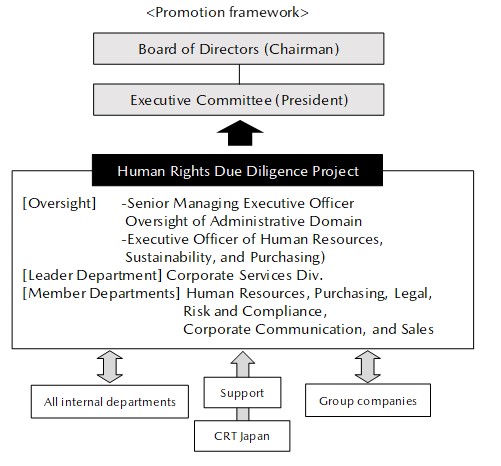

Human Rights Due Diligence Initiatives
The Human Rights Due Diligence Project Team (hereinafter referred to as the "Human Rights DD Project Team"), with the participation of the heads of several relevant divisions, is responsible for confirming and updating the initiatives and way of proceeding of the human rights due diligence, the progress of the initiatives, and the latest situation regarding human rights. The team reports activity plans, progress and results to the Board of Directors, and Executive Committee once every six months and the receives necessary instructions. In FY March 2025, the results of the impact assessment conducted at domestic offices and within the supply chain with the support of the third-party non-profit organization Caux Round Table (CRT) Japan, as well as the activity plan for the next fiscal year, were reported and the prioritization of issues was discussed. Additionally, in FY March 2025, the Risk & Compliance Committee defined human rights risks as one of the key company-wide risks to be addressed. The progress was reported to the executive committee and the board of directors, and it is being promoted as a company-wide activity.
In FY March 2024, Mazda began partnering with CRT to advance human rights due diligence initiatives and refine its corrective and remediation measures for responding to human rights issues in line with the value chain. Groupwide coordination is being practiced globally as part of these initiatives. In addition, the Company is advancing phased human rights due diligence activities and corrective and remediation processes based on the United Nations Guiding Principles on Business and Human Rights and with emphasis placed on engagement with rights holders*. The Company is thereby developing a human rights management system that incorporates with the board members. Progress on the above processes will be disclosed appropriately on Mazda's corporate website.
In March 2024, Mazda invited CRT Japan's Hiroshi Ishida to lead a lecture for all executive officers and general managers on the theme of business and human rights. This lecture served as an opportunity to re-realize the importance of human rights initiatives given recent changes to the operating environment for companies. Moreover, Mazda arranged a human rights due diligence risk assessment workshop on the theme of business and human rights in April 2024 with the facilitation of CRT Japan. This workshop was attended by managements from various areas of the Company, with a total of 40 participants from 33 internal departments and 6 Group companies.
Starting in September 2024, we conducted a human rights impact assessment to confirm the risk situation and evaluate its impact based on direct dialogue with rights holders, with the cooperation of CRT, on important human rights themes identified in workshops. We also strengthened the complaint handling mechanism to take corrective and remedial actions. For details on the activities conducted in fiscal 2024, please refer to the following.
Detailed report of FY2024 Human Rights Due Diligence Activities
* To building trust with people who have human rights through direct engagement.
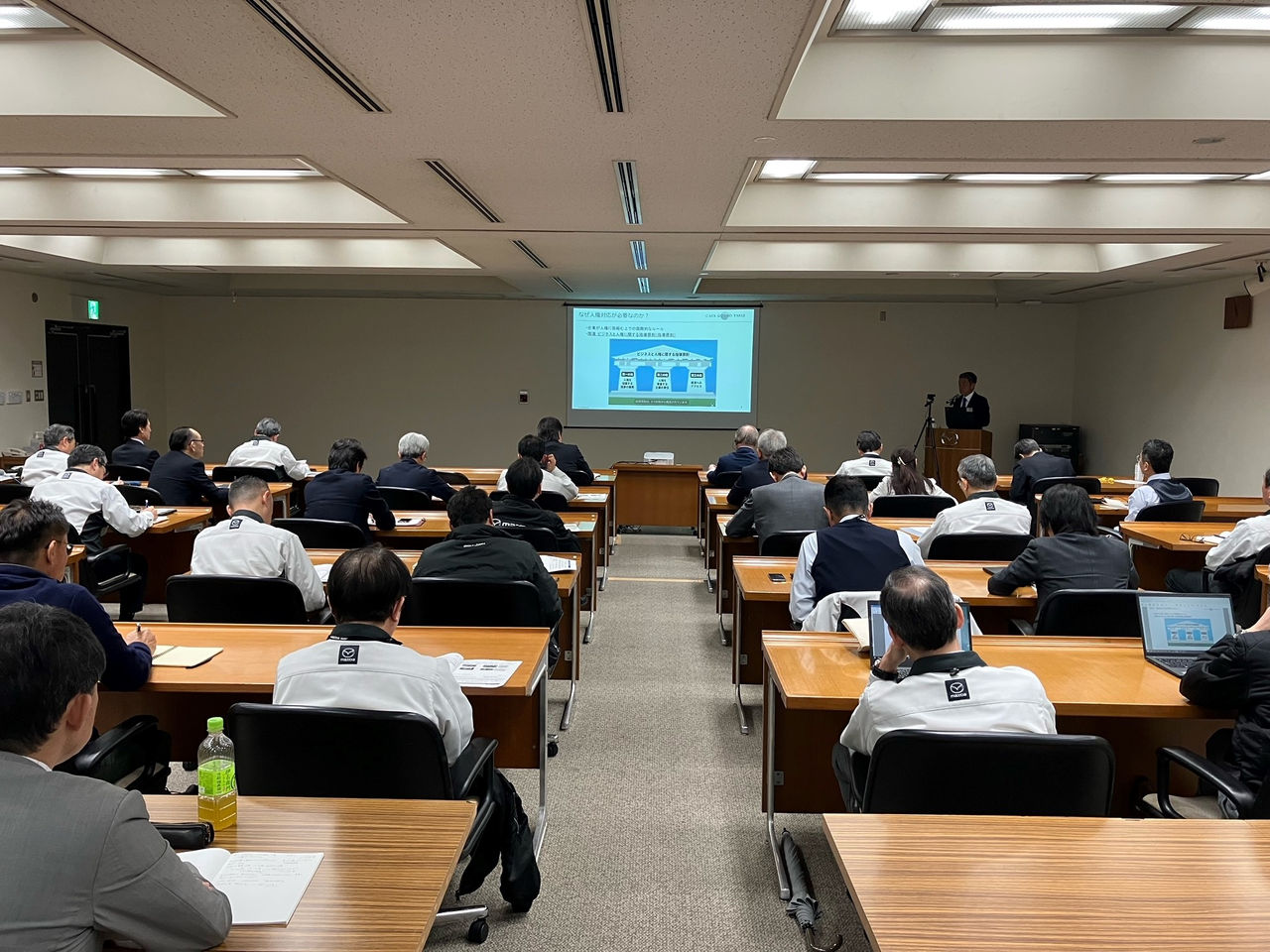

Lecture for executive officers
Human Rights Due Diligence Risk Assessment (Workshop)
Based on the results of the desktop survey, a two-day of the HRDD workshops was held on April 16 and 17, 2024, with the participation of 40 people from 33 relevant divisions and 6 Group companies, with the aim of prioritizing human rights themes relevant to the Mazda Group's business. In the workshop, facilitated by CRT Hiroshi Ishida, participants discussed high-priority of the human rights issues and stakeholders along the value chain, comparing the actual status of the Mazda Group's business with the results of the desktop survey, and identified priority of the human rights themes for the Mazda Group to address.
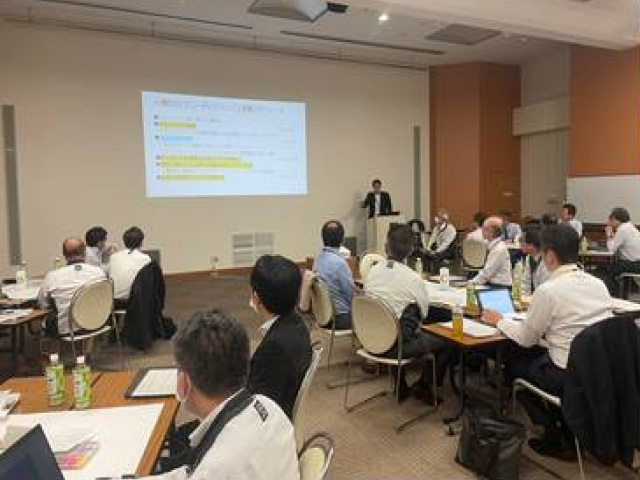

Human Rights DD Project Team and CRT evaluated each issues from the viewpoint of rightsholder's impact, and identified three themes: (1) labor and safety environment (including foreign workers) at overseas bases and domestic and overseas suppliers and dealers, (2) human rights issues related to raw material procurement (including conflict minerals), and (3) human rights issues related to AI-related services. The issues and problems identified at the workshop as involving the entire value chain will continue to be addressed by the departments in charge of these issues.
Human Rights Impact Assessment (Selection of human rights theme)
Among above three human rights issues (1)(2)(3) which is identified as priority issues for the Mazda Group to address by HRDD workshop, we considered the scope of rights holders and the preparation period required to start the project, and decided to start the impact assessment in 2024 by focusing on the workplace environment of foreign workers (including technical intern trainees) at domestic business sites and in the supply chain.
Human Rights Impact Assessment (Direct Dialogue with Rights-holders)
Based on the results of the above QR code questionnaire in accordance with the Dhaka Principles for Dignified Migration, CRT conducted a human rights impact assessment of foreign workers at three of Company A's stores (sales company), as well as at Company B's one factory and Company C's two factories (parts supplier companies). This impact assessment was conducted by CRT, a third-party organization, and was conducted in consideration of rights-holders' human rights to ensure that individuals are not identified and that they are not disadvantaged or retaliated against for their statements.
| Date and Time | Office/Supplier Name | Subject (of taxation, etc.) | Related Human Rights Issues | What was confirmed in the interviews |
|---|---|---|---|---|
| October 10-11, 2024 | Company A | Foreign workers in three stores | Fair wages |
|
| Occupational safety and health |
|
|||
| Other |
|
|||
| November 11-13, 2024 | Company B Company C |
Two plants of Company C and two plants of Company B | Fair wages |
|
| Occupational safety and health |
|
|||
| Appropriate living environment |
|
|||
| Access to Grievance/Remedy |
|
|||
| Other |
|
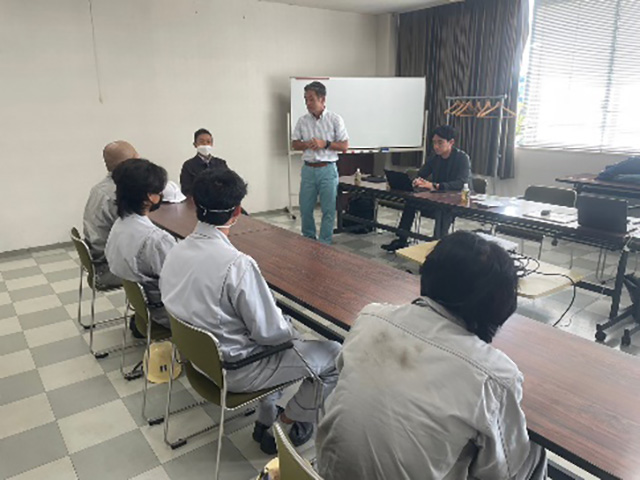

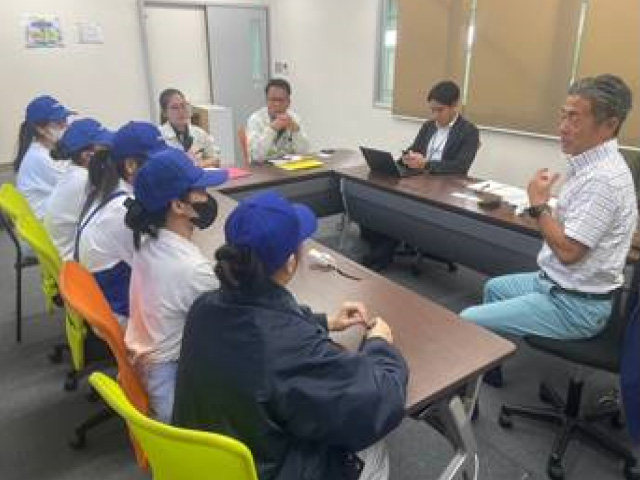

Interviews with technical interns from Company B and Company C
Results of the Human Rights Risk and Impact Assessment
In the human rights due diligence conducted by CRT, in FY2024 there are no serious human rights violations. However, several minor human rights concerns were identified that require attention from a human rights perspective, and we plan to address them appropriately.
Engagement with stakeholders for remediation
Feedback was provided to stakeholders on the human rights issues identified through the above human rights impact assessment (direct dialogue with rights-holders) to encourage them to take corrective action. Each company is sharing information on future initiatives, including at the Board of Directors level, to prioritize measures to be taken. Some corrective actions have already been taken, such as displaying multilingual signs that are easy for foreign workers to understand and improving living conditions in terms of safety and health. Mazda will also follow up on these efforts, cooperating with corrective measures as necessary.
Future Initiatives
The Mazda Group plans to conduct a follow-up survey to confirm the status of implementation of efforts to resolve human rights issues identified through direct dialogue with rights-holders in the human rights impact assessment, and to follow up on the results of these efforts. Moreover, The CRT will again conduct a direct dialogue with rights-holders to confirm whether the issues have been resolved. While establishing a foundation of trust with rights-holders, which has been fostered through these HRDD initiatives, we will promote the following initiatives.
- Expand the scope of impact assessment and share knowledge of assessment results (Expand to Group and suppliers)
- Identified issues through self-assessment of human rights due diligence have been shared with major local suppliers, and improvement initiatives are currently being implemented.
- Identified at the workshop Addressing the human rights issues remaining two critical Ongoing (e.g., dialogues with external experts, identify of risk issues and countermeasure planning according recent trend analysis)
Supply Chain Human Rights Due Diligence
Identification of Human Rights Issues
Human rights issues connected to suppliers* are clearly specified in Mazda Supplier Sustainability Guidelines, and Mazda requires all business partners to adhere to its efforts to respect human rights.
* Mazda has identified nine human rights issues suppliers should work on: abolition of discrimination, respect for human rights, prohibition of child labor, prohibition of forced labor, non-use of conflict minerals or any other raw materials that may cause social issues, wages, working hours, dialogue with employees, and safe and healthy working environments.
Initiative Self-Diagnosis and Questionnaire
In Mazda Supplier Sustainability Guidelines, all suppliers are asked to diagnose their own efforts from the perspective of tracking of conditions, systems, impact prevention measures, in-house awareness raising, and regular monitoring. In terms of evaluations of the effectiveness of such initiatives, the yearly questionnaire for suppliers verifies that they are appropriately carrying out the self-diagnosis described above.
【Statistics from FY March 2025】
- No identified issues related to human rights initiatives or other matters.
Responsible Mineral Procurement Efforts
Mazda understands that conflict minerals* are among the most serious social issues in its supply chains. This is especially true given how these minerals can result in human rights violations and illegal mining in conflict-affected regions as well as funding of armed groups. The Company therefore aims not to use conflict minerals or any other raw materials that may cause social issues. This commitment is clearly defined in the Mazda Supplier Sustainability Guidelines, which all suppliers are instructed to follow. In addition, based on requests from companies to which Mazda supplies vehicles, the Company conducts conflict minerals surveys of suppliers from which the Company orders components or materials used in the finished supplied vehicles. For the surveys, the Company uses the format designated by the Responsible Business Alliance (Electronic Industry Citizenship Coalition).
【Statistics from FY March 2025】
- Conflict minerals surveys administered to approx. 300 suppliers.
* Conflict minerals are defined as minerals and derivative metals designated by the Dodd–Frank Wall Street Reform and Consumer Protection Act (Section 1502) that are sourced from and used as financial sources for armed groups in conflict-affected regions in the Democratic Republic of Congo or adjoining countries (regulated minerals: tantalum, tin, tungsten, and gold). Under this act, listed U.S. companies are obliged to report that no conflict materials are used in their products.
Corrective and Remediation Measures
External third-party complaint handling platform
Mazda joined the Japan Center for Engagement and Remedy on Business and Human Rights (JaCER) in June 2025. This non-judicial platform, provided by JaCER in accordance with the UN Guiding Principles on Business and Human Rights, will accept complaints related to human rights in multiple languages from all stakeholders surrounding Mazda. This includes employees of Mazda and its affiliated companies, domestic and international Tier 1 suppliers, Tier 2 and subsequent suppliers with no direct dealings with Mazda, and local communities. Mazda will take effort to address and resolve such complaints through dialogue, guided by the expertise of JaCER in business and human rights. In handling complaints and reports through this engagement and remedy platform, the anonymity of whistleblowers and the confidentiality of the reports will be secured. Additionally, transparency will be secured so that whistleblowers are informed of the current status of the handling of their reports.
- Link to JaCER's reporting form (32 languages): https://jacer-bhr.org/en/application/index.html
- Link to JaCER's reporting form in Chinese (Simplified): https://jacer-bhr.org/cn/application/index.html
Internal Reporting System
The Company has established the Mazda Global Hotline as an in-house system for receiving reports regarding compliance and other issues. With its contact points set up both inside the Company and outside (attorney's office), the hotline enables Mazda Group employees to choose a contact point to submit their reports to either under their real names or anonymously. The content of these reports is carefully handled, and the whistleblowers' confidentiality is completely protected. In so doing, Mazda takes sufficient follow-up measures to ensure that those who make reports to the hotline or who cooperate in an investigation will not be subject to unfavorable treatment. The Company distributes Compliance Cards with the contact information for the hotline to all employees during compliance education programs. As part of its efforts to make the hotline better known to everyone, Mazda also puts up posters and implements e-learning programs. In addition, information on the use of the hotline is disclosed. Mazda Global Hotline is also introduced to suppliers so they can receive consultation regarding any doubts that may arise during transactions with Mazda or with Mazda Group companies.
Human Rights Counseling by Dedicated Counselors
Mazda has established a Human Rights Counseling Desk and a Female Employee Counseling Desk to appropriately respond to human rights consultations from employees, through providing advice and supporting early relief from human rights violations. For more than 10 years, the counseling desks have responded to consultations from sexual minority (LGBTQ+) employees and, working with workplaces, have continued to provide support. Mazda has set out regulations mandating strict confidentiality, guaranteeing immunity from reprisals, and ensuring that no disadvantage will accrue to employees who request consultations. Counseling is offered in various forms, such as face-to-face, by telephone, or by email. The Company promptly responds to consultations, with the goal of rapidly improving the work environment for the affected employee, while taking any necessary measures against the relevant violator based on factual inquiry. The Company also offers the necessary support to ensure respect for human rights throughout the entire workplace, through the abovementioned counseling desks. For example, these desks offer advice on workplace culture improvement to the employee's supervisor and provide counseling and advice for the employees and other persons concerned.